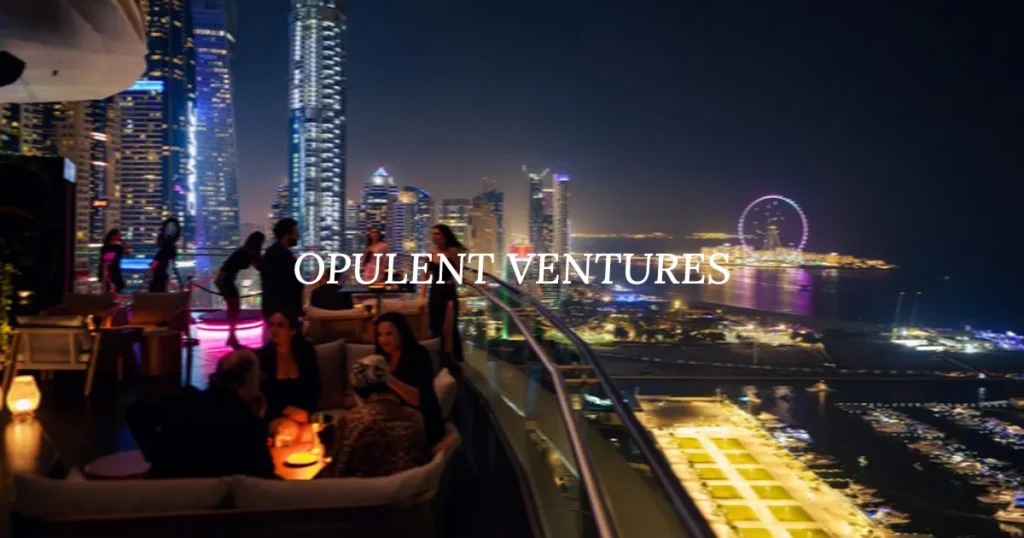The Opulent Side Hustle: How to Monetize Your Mansion as a Luxury Event Venue
1. Introduction
In an era where experiences are valued more than possessions, the concept of luxury side hustles has gained unprecedented momentum. From hosting exclusive pop-up dinners to renting out designer wardrobes, affluent individuals are finding creative ways to monetize their assets while catering to a growing demand for unique and unforgettable experiences. Among these trends, one opportunity stands out as particularly promising: transforming a mansion into a high-end event venue. For mansion owners, property investors, and luxury entrepreneurs, this venture not only unlocks hidden potential within existing real estate but also taps into a lucrative market driven by discerning clients seeking opulence and exclusivity.
This shift toward experiential spending is reshaping how people invest in luxury lifestyles and savvy homeowners are capitalizing on it. By converting sprawling estates into breathtaking settings for weddings, corporate retreats, or private soirées, mansion owners can generate substantial income streams while showcasing their properties in a way that highlights their grandeur. This approach doesn’t just maximize financial returns; it redefines what it means to live luxuriously in today’s economy.
Transforming a mansion into a high-end event venue isn’t merely about renting space it’s about creating immersive environments where memories are made and dreams come true. And for those with the vision and resources to pursue this path, the rewards extend far beyond monetary gains. Whether you’re a homeowner looking to offset maintenance costs, an investor eyeing untapped markets, or an entrepreneur eager to carve out a niche in the luxury sector, this guide will explore why turning your mansion into an elite event destination could be your next big move.
2. Is Your Mansion Suitable? Key Considerations for Hosting Unforgettable Events
When evaluating whether a mansion is ideal for hosting events like weddings, galas, or corporate retreats, several critical factors determine its suitability. Below are the key considerations to ensure your venue not only meets practical needs but also creates a memorable experience.
1. Location: Balancing Convenience and Charm
A mansion’s location sets the stage for guest experience and logistical success.
- Proximity to Urban Centers : Easy access to cities reduces travel time for attendees, especially those flying in. Nearby accommodations and amenities (hotels, restaurants) enhance convenience.
- Scenic Appeal : Lush landscapes, coastal views, or mountain backdrops elevate ambiance, offering stunning photo opportunities and a serene atmosphere.
- Accessibility : Ensure ample parking, clear signage, and proximity to major roads or public transit. Consider accessibility for guests with disabilities (ramps, elevators).
Example : A mansion nestled in the hills near a city offers a tranquil escape with skyline views, yet remains a 20-minute drive from downtown hotels.
2. Layout & Capacity: Seamless Flow for Every Occasion
The mansion’s design must accommodate the event’s structure and scale.
- Dedicated Spaces :
- Ceremonies : Grand staircases, gardens, or ballrooms for vows or keynotes.
- Dining : Spacious halls or terraces for seated meals.
- Entertainment : Lounges, patios, or theaters for dancing, mingling, or presentations.
- Guest Capacity : Avoid overcrowding by matching room sizes to attendee numbers. Ensure smooth transitions between spaces (e.g., cocktail hour in the garden followed by dinner indoors).
Example : A mansion with a vaulted-ceiling ballroom (200 guests) and adjacent courtyard (50 guests for intimate gatherings) offers flexibility.
3. Amenities: Elevating Comfort and Functionality
Modern amenities enhance both guest experience and event execution.
- Recreational Features : Pools, gardens, or game rooms for pre- or post-event activities.
- Gourmet Kitchens : On-site catering spaces with high-end appliances for seamless meal service.
- Parking & Tech : Ample parking for guests and vendors; reliable Wi-Fi, AV systems, and charging stations for presentations or live streams.
Example : A mansion with a chef’s kitchen and outdoor fire pits allows for bespoke dining and cozy evening ambiance.
4. Unique Selling Points (USPs): Standout Features
Leverage distinctive traits to differentiate your venue and attract specific audiences.
- Architectural Features : Grand fireplaces, stained glass, or modern minimalist designs.
- Historical Significance : A storied past or cultural heritage adds charm for themed events.
- Panoramic Views : Floor-to-ceiling windows or rooftop terraces showcasing natural beauty.
Example : A 19th-century estate with restored Victorian interiors offers a romantic backdrop for weddings, while a glass-walled modern mansion highlights sunset vistas for corporate mixers.
Final Considerations: Balancing Trade-offs
No venue is perfect. Assess priorities: A remote mansion with breathtaking views may require shuttle services, while a historic home might need upgraded tech infrastructure. Align choices with the event’s purpose, guest demographics, and budget.
By evaluating these factors holistically, you can determine if your mansion or one you’re considering is not just suitable, but exceptional for creating unforgettable moments.
3. Legal & Regulatory Foundations
Navigating legal and regulatory requirements is critical for event planners to ensure compliance, mitigate risks, and protect all stakeholders. Below is an overview of key considerations across zoning laws, permits, insurance, and contracts.
Zoning Laws
Zoning regulations dictate how properties can be used, distinguishing between residential, commercial, and mixed-use areas.
- Residential vs. Commercial Use : Verify if the venue is zoned for events. Hosting a large gathering in a residential area (e.g., a backyard wedding) may require special permits, while commercial venues (e.g., hotels, convention centers) typically have pre-approved permissions.
- Restrictions : Check for limits on noise, parking, traffic, or occupancy. For example, a residential neighborhood might prohibit amplified music after 10 PM.
- Penalties : Non-compliance can result in fines, event shutdowns, or legal action. Always consult local zoning offices early in planning.
Permits
Events often require multiple permits to meet legal standards:
- Event Licenses : Municipal permits may be needed for large gatherings, street closures, or public-space usage.
- Alcohol Sales : Secure a liquor license or temporary permit if serving alcohol, adhering to state/local laws (e.g., age restrictions, serving hours).
- Noise Ordinances : Obtain permits for amplified sound or late-night events to avoid noise complaints.
- Fire Safety Codes : Ensure venues comply with occupancy limits, emergency exits, and fire extinguisher placements. Fire marshals may inspect the site pre-event.
Pro Tip: Start the permitting process early, as approvals can take weeks.
Insurance
Adequate coverage safeguards against unforeseen incidents:
- General Liability Insurance : Covers injuries, property damage, or third-party claims (e.g., a guest slipping and falling).
- Event-Specific Policies : Consider cancellation insurance (for weather/vendor issues) or liability for vendors (e.g., caterers, performers).
- Property Protection : Insure rented venues or equipment against damage or theft.
- Additional Insured Endorsements : Venues often require planners to add them to insurance policies. Work with a broker to tailor coverage to your event’s scale and risks.
Contracts
Clear, legally binding agreements prevent misunderstandings:
- Scope of Services : Define deliverables (e.g., setup, vendors, timelines) and exclusions.
- Payment Terms : Outline deposits, payment schedules, and refund policies.
- Cancellation Clauses : Specify penalties for client/planner cancellations and force majeure scenarios (e.g., natural disasters).
- Damages : Include liability limits and procedures for resolving disputes.
Best Practice: Have a lawyer review contracts to ensure enforceability and compliance with local laws.
Legal compliance is non-negotiable in event planning. Proactively address zoning, permits, insurance, and contracts to avoid disruptions, financial losses, or reputational harm. Always consult legal experts and local authorities to stay updated on regulations. By prioritizing these foundations, planners can deliver seamless, secure events while protecting their business and clients.
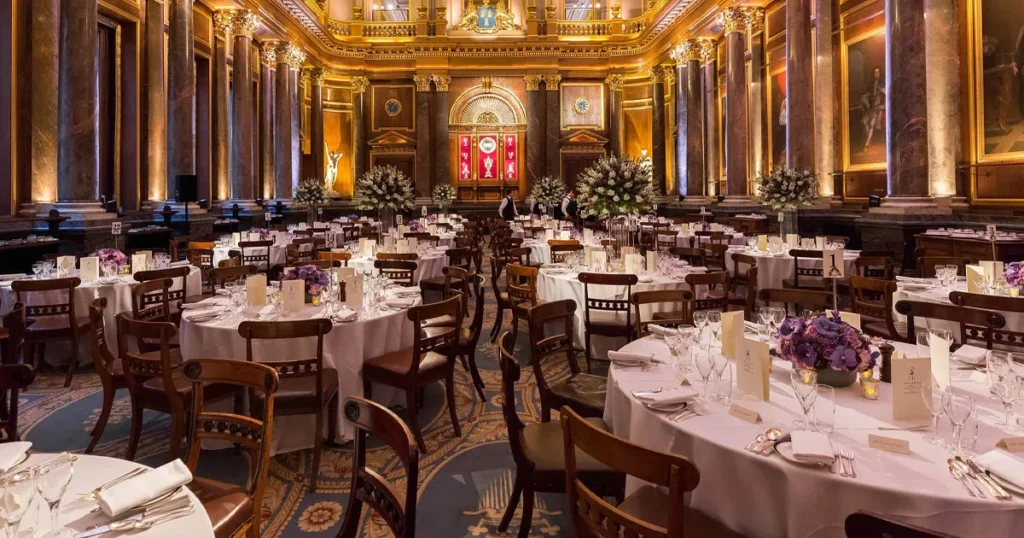
4. Crafting a Luxury Brand Identity: A Deep Dive into Opulence & Exclusivity
1. Branding: The Soul of Luxury
A luxury brand’s identity must transcend aesthetics to embody a narrative of rarity, craftsmanship, and emotional resonance.
Name
- Linguistic Precision : Use roots from romance languages (French, Italian, Latin) to evoke heritage.
- Examples : “Château Élégance” (French for “Castle of Elegance”), “Villa Aurelian” (Latin for “golden”), or “Sartoria” (Italian for “tailoring”).
- Sound & Symbolism : Names should roll off the tongue with gravitas. Avoid trends; prioritize timelessness.
- Tip : Test names with focus groups of HNWIs (high-net-worth individuals) for emotional impact.
Logo
- Design Elements :
- Heritage Cues : Family crests, wax seals, or monograms (e.g., the interlocking Cs of Chanel).
- Typography : Serif fonts (e.g., Didot, Bodoni) for sophistication; custom lettering for uniqueness.
- Color Psychology :
- Gold/Black : Power and exclusivity (e.g., Cartier).
- Deep Greens/Blues : Trust and opulence (e.g., Tiffany & Co.’s robin’s egg blue).
- Subtlety : Avoid overcrowding. The Rolls-Royce emblem is minimal yet instantly recognizable.
Tagline
- Emotional Resonance : Connect to the brand’s raison d’être.
- Examples :
- Hermès: “A mastery of artful living.”
- Rolex: “A crown for every achievement.”
- Brevity : Keep it under 7 words.
- Examples :
2. Marketing Strategy: Curating Desire
Luxury marketing is about creating aspiration, not just awareness.
Visual Content
- Photography/Videography :
- Lighting : Use golden-hour or chiaroscuro techniques to highlight textures (e.g., marble veining, cashmere fabrics).
- Styling : Partner with set designers to stage spaces with curated art, rare antiques, and bespoke furnishings.
- Drone Shots : Capture sprawling estates or yacht views to emphasize scale and exclusivity.
- Content Themes :
- Behind-the-Scenes : Show artisans crafting custom details (e.g., a tailor hand-stitching a gown).
- Lifestyle Reels : Feature UHNWIs (ultra-HNWIs) enjoying private experiences (e.g., a sunset helicopter tour).
Digital Presence
- Website :
- User Experience : Parallax scrolling, ambient soundscapes (e.g., soft piano music), and micro-interactions (hover effects on product details).
- SEO : Target long-tail keywords like “private island luxury retreat Mediterranean” or “bespoke diamond jewelry concierge.”
- Virtual Tours : Use Matterport for 3D walkthroughs; add hotspots for interactive details (e.g., “Click to view hand-painted ceiling”).
- Social Media :
- Instagram : Post carousels of client testimonials, “A Day in the Life” stories, and user-generated content (UGC) from influencers.
- LinkedIn : Share thought leadership (e.g., “The Future of Sustainable Luxury Travel” ).
Partnerships
- Strategic Alliances :
- Luxury Brands : Collaborate on limited-edition products (e.g., a perfume line with a niche fragrance house).
- Concierge Services : Offer exclusive packages (e.g., a Michelin-starred chef for a private dinner).
- Events : Sponsor invite-only galas (e.g., Art Basel VIP lounges) or co-host pop-ups with Rolex or Aston Martin.
- Influencer Marketing : Engage “quiet influencers” (CEOs, royals, or legacy families) for discreet endorsements.
Exclusivity Angle
- Scarcity Tactics :
- Waitlists : Require applications for memberships (e.g., Soho House’s vetting process).
- Limited Editions : Launch seasonal collections (e.g., a holiday line of 10 diamond-encrusted watches).
- Bespoke Experiences :
- Personalization : Monogramming, custom fittings, or curated itineraries (e.g., a safari tailored to a client’s favorite novel).
- Surprise & Delight : Leave a handwritten note with a rare vintage wine in a guest’s room.
3. Storytelling & Consistency: The Narrative Thread
Luxury brands thrive on mythos.
Brand Narrative
- Origin Story : Highlight craftsmanship (e.g., “Founded in 1890 by master perfumers in Grasse” ).
- Values : Sustainability (e.g., eco-friendly yachts), philanthropy (e.g., donating to arts foundations), or innovation (e.g., blockchain-verified gemstones).
Consistency Across Touchpoints
- Brand Guidelines : Define rules for imagery, tone (e.g., “confident yet discreet”), and even scent (e.g., signature candles in showrooms).
- Staff Training : Ensure every interaction mirrors brand values (e.g., concierge trained in five-star hospitality).
4. Customer Journey: From Curiosity to Loyalty
Map every interaction to deepen emotional connections.
Discovery Phase
- Aspirational Content : Instagram ads featuring a celebrity ambassador in your villa.
- PR : Secure features in Robb Report or Architectural Digest .
Booking Experience
- White-Glove Service : Assign a personal concierge for seamless planning.
- Unboxing : Deliver welcome kits with monogrammed stationery, a handwritten note, and a curated gift (e.g., a vintage book).
Post-Purchase Engagement
- Loyalty Programs : Tiered rewards (e.g., VIP access to events for repeat clients).
- Follow-Up : Send a leather-bound photo album of their stay or a custom illustration of their experience.
5. Metrics & Evolution
- KPIs : Track conversion rates, average order value (AOV), and social media engagement (likes from HNWIs).
- Adaptation : Refresh branding every 5–7 years to stay relevant (e.g., Gucci’s 2010s reinvention under Alessandro Michele).
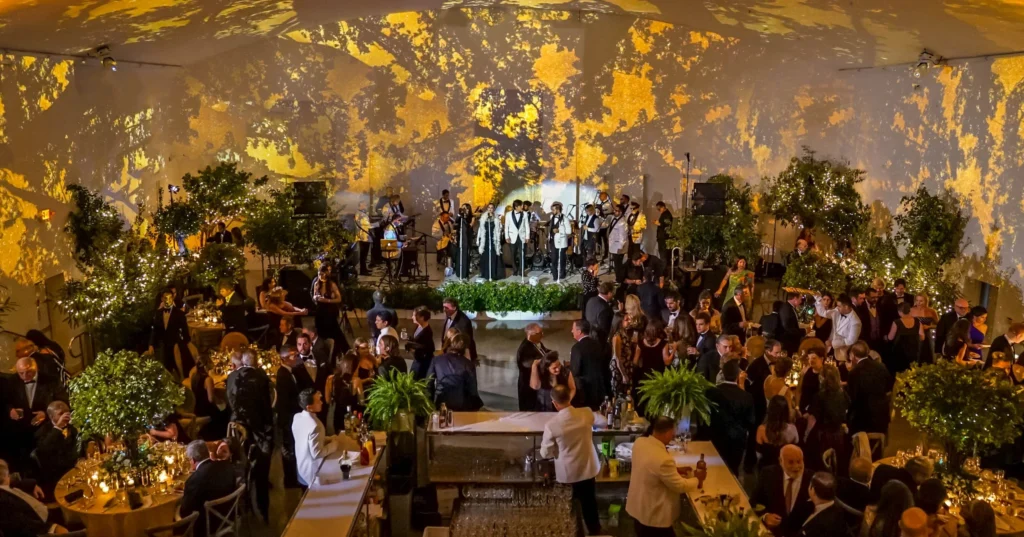
5. Curating High-End Services & Packages for Elite Events
In the realm of luxury event planning, curating bespoke experiences demands a meticulous blend of elegance, personalization, and flawless execution. Tailored to discerning clients, high-end services and packages transform ordinary gatherings into unforgettable moments. Below is a detailed exploration of how elite event curators elevate weddings, galas, corporate retreats, and private parties through strategic offerings.
Event Types: Crafting Unique Experiences
- Weddings
- Focus : Romance, intimacy, and lifelong memories.
- Needs : Themed decor, gourmet catering, and seamless coordination to reflect the couple’s vision.
- Galas
- Focus : Grandeur, philanthropy, and sophistication.
- Needs : Opulent decor, live entertainment, and butler service for a polished ambiance.
- Corporate Retreats
- Focus : Professionalism, team-building, and brand alignment.
- Needs : State-of-the-art venues, AV integration, and curated activities to inspire collaboration.
- Private Parties
- Focus : Exclusivity, creativity, and personal indulgence.
- Needs : Unique themes (e.g., masquerade balls), custom menus, and discreet staffing.
Packages: Flexibility Meets Luxury
- All-Inclusive Excellence
- Components : Catering, staffing, decor, and logistics handled end-to-end.
- Ideal For : Clients seeking stress-free planning. Examples:
- Weddings : Full-service coordination, from floral arches to live bands.
- Galas : Red-carpet setups, multi-course dinners, and security.
- Corporate Retreats : Meeting spaces, team activities, and branded materials.
- À La Carte Sophistication
- Options : Venue-only bookings, vendor referrals, or specialized services.
- Ideal For : Clients with specific preferences. Examples:
- Private Parties : Renting a historic mansion with curated vendor partnerships.
- Corporate Events : Selecting a venue while outsourcing catering for a custom menu.
Customization: The Art of Personalization
- Tailored Themes
- Examples :
- A rustic-chic wedding with wildflower centerpieces and farmhouse tables.
- A modern gala with geometric decor and LED lighting.
- A corporate retreat branded with company colors and interactive tech displays.
- Examples :
- Gourmet Menu Planning
- Details : Seasonal ingredients, dietary accommodations (e.g., vegan, gluten-free), and interactive stations (e.g., sushi chefs, artisanal cheese bars).
- Signature Touches : Custom cocktails (e.g., a “Bride’s Blush” margarita) or wine pairings led by a sommelier.
- Personalized Luxuries
- Butler Service : Discreet staff for champagne pours or hors d’oeuvres.
- Exclusive Add-Ons : Monogrammed linens, personalized guest favors, or fireworks displays.
High-end event curation merges creativity with precision, offering packages and customization that cater to the unique essence of each occasion. Whether through turnkey all-inclusive solutions or à la carte flexibility, the goal is to deliver an experience that resonates with sophistication and leaves a lasting impression. For those seeking to host events that transcend the ordinary, this approach ensures every detail is as extraordinary as the moment itself.
6. Pricing Strategy for Maximum Profit
A well-crafted pricing strategy is essential for maximizing profitability while remaining competitive. By combining market insights, flexible pricing tiers, and upselling opportunities, businesses can optimize revenue streams and enhance customer value. Here’s how to implement these strategies effectively:
1. Market Research: Foundation for Competitive Pricing
Analyze Competitors’ Rates
Conduct a thorough audit of competitors’ pricing models to identify gaps and opportunities. Tools like mystery shopping, online price tracking, or competitor service comparisons can reveal benchmarks. For example, if local hotels charge 200–300 per night, positioning your rates at 250–350 with added perks (e.g., free breakfast) can attract cost-conscious and premium customers alike.
Assess Local Demand
Use surveys, social media trends, or historical sales data to gauge demand fluctuations. For instance, a beach resort might notice higher demand during summer but lower occupancy in winter. This insight allows businesses to adjust pricing dynamically, ensuring rates align with what customers are willing to pay at different times.
Key Takeaway : Avoid underpricing or overpricing by grounding decisions in data. Balance competitiveness with profitability.
2. Tiered Pricing: Maximize Revenue Across Demand Cycles
Off-Peak Discounts
Encourage sales during low-demand periods by offering discounts or bundled deals. For example, a spa might offer 20% off weekday massages to attract customers during slower days. This fills capacity and maintains cash flow.
Seasonal Rates
Adjust pricing for holidays, festivals, or local events. A vacation rental could charge 30% more during a major festival (e.g., New Year’s Eve) but offer “early bird” discounts for bookings made months in advance.
Premium Weekend Slots
Capitalize on high-demand periods (e.g., weekends, holidays) by pricing premium services higher. A golf course might charge double for weekend tee times compared to weekdays, leveraging scarcity to drive profit.
Key Takeaway : Dynamic tiered pricing balances accessibility and exclusivity, ensuring revenue stability year-round.
3. Upselling: Boost Profit Margins with Add-Ons
Luxury Add-Ons
Enhance average transaction value by offering high-margin upgrades. For example:
- Spa Access : Sell day passes or packages with treatments (e.g., “Book a room and enjoy a complimentary sauna session”).
- Yacht Charters : Pair hotel stays with private boat rentals for a “luxury coastal experience.”
- Luxury Transportation : Partner with limo services to offer airport transfers at a premium.
Bundling Incentives
Create “experience packages” that combine core offerings with add-ons. A hotel might offer a “Romance Package” including champagne, a couples’ massage, and dinner, priced 15% lower than buying items separately. This encourages customers to spend more while perceiving value.
Train Staff to Upsell
Empower frontline teams to suggest upgrades during bookings or check-ins. Scripts like, “Would you like to upgrade to a suite with a sea view for an extra $50?” can significantly impact revenue.
Key Takeaway : Upselling transforms one-time buyers into high-value customers while increasing margins.
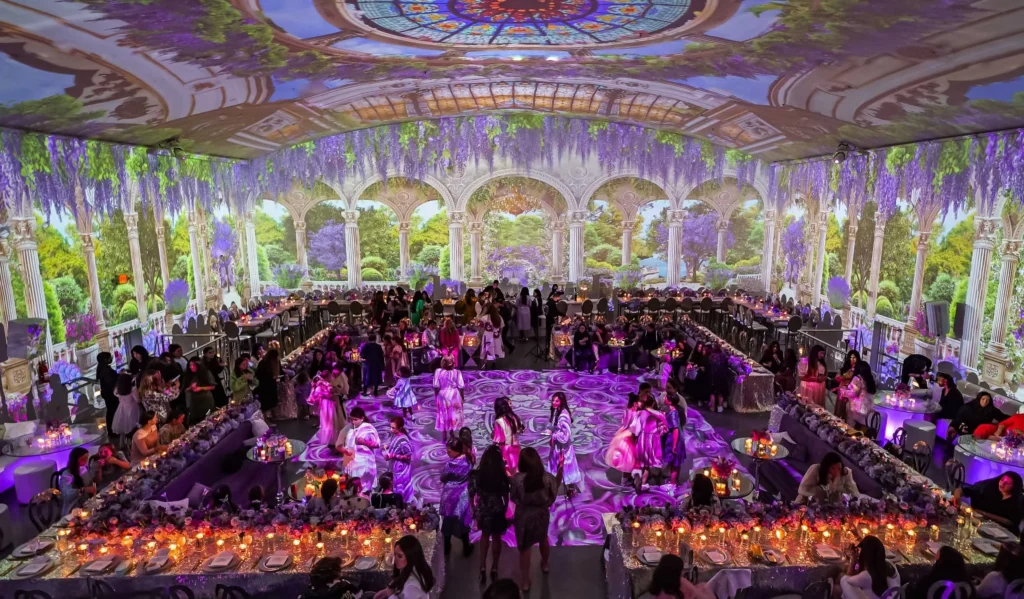
7. Elevating the Client Experience
In the realm of luxury events, exceeding expectations is not just a goal it’s a standard. Elevating the client experience requires meticulous attention to detail, personalized service, and a commitment to excellence at every touchpoint. Here’s how industry leaders achieve this:
White-Glove Service: Anticipating Every Need
White-glove service embodies unparalleled hospitality, tailored to make clients feel uniquely valued.
- Dedicated Event Coordinators : A single point of contact oversees every detail, from concept to execution, ensuring seamless communication and personalized attention.
- Valet Parking & Concierge Touches : Effortless arrivals with valet services, paired with thoughtful amenities like welcome gifts or customized itineraries, set the tone for exclusivity.
- Staff Training : Teams undergo rigorous training in etiquette, crisis management, and cultural sensitivity to deliver discreet, polished service that aligns with the event’s prestige.
Vendor Partnerships: Curating Uncompromising Quality
Luxury events demand vendors who share a vision for perfection.
- Vetted Suppliers : Collaborate with pre-screened caterers, florists, and entertainers known for craftsmanship and reliability. Think Michelin-starred chefs, avant-garde floral designers, and A-list performers.
- Exclusive Offerings : Partnerships unlock rare experiences a private champagne tasting, bespoke floral installations, or a surprise performance by a renowned artist to create unforgettable moments.
- Consistency & Trust : Established relationships ensure vendors align with the event’s ethos, eliminating risks and guaranteeing flawless execution.
Privacy & Security: Safeguarding Exclusivity
For high-profile clients, discretion is non-negotiable.
- NDAs & Confidentiality : Staff and vendors sign strict non-disclosure agreements to protect sensitive details, from guest lists to event surprises.
- Controlled Access : Gated venues, biometric checks, and discreet security personnel ensure only authorized individuals attend, maintaining an intimate atmosphere.
- Invisible Protocols : Security measures are seamlessly integrated think undercover guards or encrypted digital systems to preserve the event’s elegance without intrusion.
Post-Event Follow-Up: Nurturing Lasting Relationships
The client experience extends beyond the event itself.
- Personalized Thank-You Notes : Handwritten notes or curated gifts express genuine gratitude, reinforcing the emotional connection.
- Curated Memories : Professionally edited photo galleries or video reels allow clients to relive the experience and share it with loved ones.
- Referral Incentives : Reward loyalty with exclusive perks, such as VIP access to future events or tailored packages, encouraging long-term partnerships.
Elevating the client experience is a holistic journey that blends anticipation, artistry, and authenticity. By prioritizing white-glove service, elite partnerships, ironclad privacy, and thoughtful follow-up, event planners transform moments into lifelong memories and clients into advocates. In luxury events, the difference lies not just in what is done, but in how it’s done: with intention, precision, and heart.
8. Financial Considerations
Launching and sustaining a successful business requires careful financial planning across three key areas: initial investment , ongoing costs , and ROI projections . Each plays a critical role in ensuring long-term viability and profitability.
Initial Investment
The upfront capital required to establish the business includes:
- Renovations :
- Construction and Design : Costs for remodeling spaces, plumbing, electrical work, and aesthetic upgrades (e.g., flooring, lighting). Permits and contractor fees also factor in.
- Technology and Equipment : Investments in POS systems, software, security systems, or specialized machinery.
- Furniture and Fixtures : Desks, seating, decor, and signage tailored to brand identity.
- Marketing :
- Branding : Logo design, website development, and cohesive visual identity.
- Launch Campaigns : Digital ads, social media promotions, and influencer partnerships to build awareness.
- Grand Opening Events : Costs for hosting events to attract initial customers.
- Staff Training :
- Hiring Experts : Consultants or trainers to onboard employees.
- Materials and Programs : Training manuals, workshops, and time allocated for skill development.
Ongoing Costs
Monthly or recurring expenses essential for operations include:
- Maintenance :
- Repairs : Fixing equipment, plumbing, or structural issues.
- Cleaning Services : Regular upkeep to maintain safety and aesthetics.
- Technology Updates : Software subscriptions, hardware upgrades, and cybersecurity measures.
- Utilities :
- Electricity, water, gas, internet, and waste management fees.
- Insurance :
- Liability Coverage : Protects against accidents or lawsuits.
- Property Insurance : Covers damage to physical assets.
- Workers’ Compensation : Mandatory in many regions for employee injuries.
Note: Additional recurring costs may include salaries, inventory replenishment, and taxes, depending on the business model.
ROI Projections
Evaluating financial returns involves analyzing:
- Break-Even Analysis :
- Calculated by dividing total fixed costs (initial investment + ongoing costs) by the contribution margin per unit (revenue per unit minus variable costs).
- Example: If fixed costs are 100,000 and the contribution margin is 20 per customer, the break-even point is 5,000 customers.
- Revenue Forecasts :
- Market Demand : Project sales based on industry trends, target audience size, and competitive analysis.
- Pricing Strategy : Adjust pricing tiers or promotions to balance volume and margins.
- Seasonality : Account for fluctuations (e.g., holiday peaks or slow seasons).
- Factors Influencing ROI :
- Operational Efficiency : Streamlining processes to reduce waste.
- Customer Retention : Repeat business boosts long-term revenue.
- Scalability : Opportunities to expand services or locations.
Scenario Planning :
- Optimistic : High customer acquisition and steady growth.
- Conservative : Slower uptake, requiring cost-cutting measures.
- Pessimistic : Economic downturns or unexpected challenges.
Financial success hinges on balancing upfront investments, managing recurring expenses, and realistically projecting returns. Regularly revisiting these projections while adapting to market changes ensures the business remains agile and profitable. Accurate record-keeping and contingency planning further mitigate risks, paving the way for sustainable growth.
9. Case Studies & Testimonials: Showcasing Success Through Transformative Venues
Case studies and testimonials are powerful tools for demonstrating a venue’s ability to deliver exceptional experiences. By highlighting real-world successes, they build trust and inspire potential clients. Below are two standout examples of venues that redefined their offerings, paired with testimonials that underscore their seamless service.
Case Study 1: Converted Vineyard Mansion Boosts Wedding Bookings by 40%
Background:
A sprawling 19th-century vineyard mansion, once underutilized, underwent a stunning renovation to become a premier wedding destination. The owners sought to capitalize on its rustic charm and scenic vineyard backdrop while modernizing amenities.
Strategies Implemented:
- Luxury Upgrades: Added climate-controlled event spaces, a bridal suite, and an outdoor ceremony pergola.
- Targeted Marketing: Launched a social media campaign showcasing real weddings, emphasizing the venue’s romantic ambiance.
- Partnerships: Collaborated with top local vendors (caterers, florists) to offer curated packages.
Results:
- 40% increase in bookings within 12 months.
- Named “Top Wedding Venue” by a leading bridal magazine.
- High referral rates from past clients and vendors.
Testimonial:
“Our wedding at the vineyard was magical! The team handled every detail from the vineyard tours to the sunset reception. Guests are still raving about the views and seamless coordination.”
Emily & James, Newlyweds
Case Study 2: Historic Estate Hosts Corporate Retreats for Fortune 500 Clients
Background:
A centuries-old historic estate, once a private residence, was repurposed into a corporate retreat venue. Its goal: to attract high-profile businesses seeking a blend of heritage and modernity for strategy sessions and team-building.
Strategies Implemented:
- Tailored Spaces: Converted ballrooms into state-of-the-art conference halls with AV capabilities.
- Exclusive Experiences: Offered curated activities like guided heritage tours and gourmet dining.
- Privacy & Security: Implemented strict access controls and dedicated event managers for Fortune 500 clients.
Results:
- Hosted 15+ Fortune 500 companies in two years, including tech giants and financial firms.
- 95% client retention rate for multi-day retreats.
- Recognized by Forbes as a premier destination for corporate retreats.
Testimonial:
“The estate transformed our annual retreat. The team anticipated every need from tech setups to team activities. Executives left energized and aligned.”
Sarah Lin, Director of Events, Global Tech Innovators
Why Testimonials Matter
Client feedback reinforces a venue’s reputation for excellence. These testimonials reflect not just satisfaction, but delight in the venue’s ability to execute flawless events:
- “From the tasting menu to the cleanup, everything was effortless.” — Corporate Retreat Attendee
- A wedding client remarked, “The venue combines an impressive scale with a cozy ambiance, making it ideal for our special celebration.”
These case studies and testimonials exemplify how strategic renovations, tailored services, and a focus on client needs can elevate a venue’s success. Whether for romantic weddings or high-stakes corporate events, the proof lies in the experiences of those who’ve trusted these spaces to host their milestones.
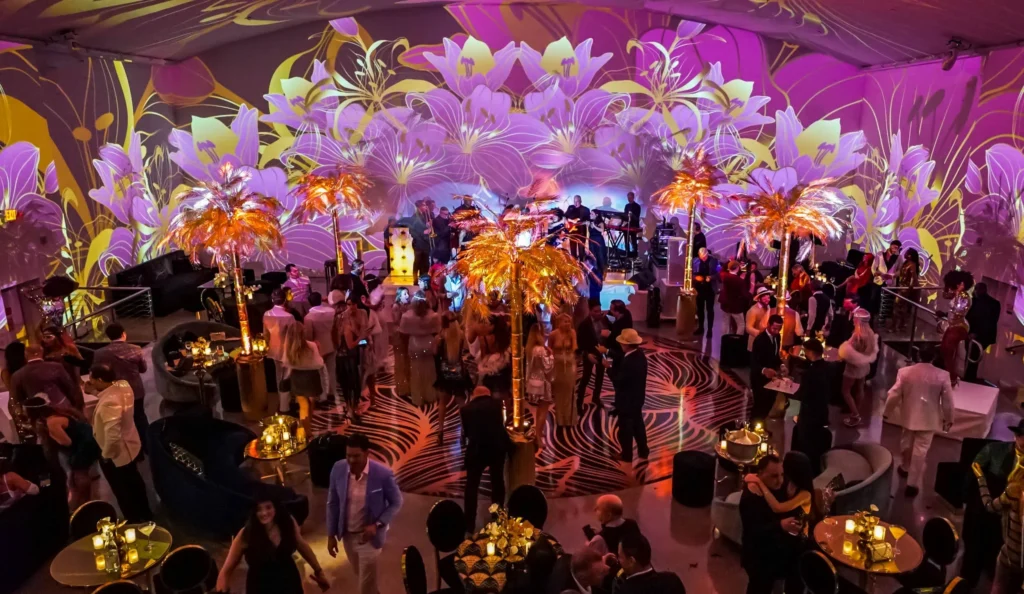
10. Future Trends & Innovations in the Events Industry
The events industry is undergoing a transformative shift, driven by technological advancements, environmental consciousness, and evolving consumer preferences. Here’s a look at three key trends shaping its future:
1. Tech Integration: Bridging Physical and Digital Experiences
Technology is revolutionizing how events are planned, experienced, and remembered. Key innovations include:
- Virtual Reality (VR) Tours : Beyond virtual events, VR now enables immersive venue previews, allowing planners and attendees to explore spaces remotely. This is especially useful for destination weddings or corporate retreats.
- AI-Powered Chatbots : AI chatbots streamline bookings, answer FAQs, and offer personalized recommendations (e.g., suggesting sessions based on attendee interests). Tools like chatbots also enhance post-event engagement through tailored follow-ups.
- Augmented Reality (AR) & IoT : AR adds interactive layers to live events (e.g., digital overlays at conferences), while IoT devices enable “smart” events with real-time crowd management and cashless payments.
- Metaverse Integration : Virtual event platforms are creating persistent 3D spaces for hybrid gatherings, blending physical and digital participation seamlessly.
Impact : Tech integration boosts efficiency, accessibility, and attendee engagement, catering to a digitally savvy audience.
2. Sustainability: Eco-Conscious Event Design
As climate concerns grow, sustainability is no longer optional. Event planners are adopting:
- Zero-Waste Practices : Eliminating single-use plastics, using compostable materials, and partnering with food rescue organizations to reduce landfill waste.
- Renewable Energy : Solar-powered stages, LED lighting, and venues powered by green energy certifications.
- Carbon-Neutral Initiatives : Offsetting emissions through reforestation projects or carbon credits, and prioritizing local vendors to minimize transportation footprints.
- Digital Solutions : Virtual tickets, apps for agendas, and digital swag bags replace paper-based materials.
Impact : Eco-friendly events appeal to environmentally aware clients and regulators, reducing costs and enhancing brand reputation.
3. Niche Markets: Hyper-Personalized Experiences
Demand for unique, tailored events is driving growth in specialized segments:
- Wellness Retreats : Focus on mental and physical health, featuring yoga, meditation workshops, nutritionists, and nature immersion. Corporate wellness retreats are gaining traction for team-building.
- Luxury Pop-Ups : High-end, ephemeral experiences like gourmet dining in exotic locations, private art showcases, or designer fashion shows, often leveraging exclusivity and storytelling.
- Celebrity Buyouts : Private events where celebrities or influencers rent entire venues for bespoke experiences, offering fans unparalleled access.
Impact : Niche markets cater to affluent demographics seeking authenticity and memorability, driving revenue through premium pricing.
The future of events lies in blending cutting-edge technology, sustainable practices, and hyper-personalized offerings. By embracing VR/AR, AI, eco-friendly strategies, and niche experiences, the industry is poised to create more inclusive, impactful, and responsible events. These trends not only meet evolving attendee expectations but also set new standards for innovation and responsibility in a rapidly changing world.
11. Conclusion & Call to Action
The allure of a luxury venue side hustle lies not only in its profitability but also in the prestige it brings. By transforming your property into an exclusive event space, you tap into a high-demand market where discerning clients willingly pay premium prices for unforgettable experiences. Whether it’s a chic rooftop soirée, a countryside wedding, or a corporate retreat, your venue can become synonymous with elegance and sophistication boosting both your income and reputation.
Audit Your Property’s Potential
Take a fresh look at your space. Does it boast architectural charm, scenic views, or unique amenities? Even a modest backyard or penthouse can be reimagined as a luxury setting with the right vision. Conduct a thorough audit: assess layout flexibility, accessibility, and “wow” factors. Partner with professionals event planners, interior designers, or legal advisors to refine your concept, ensure compliance, and elevate your offering. Their expertise can turn a good idea into a flawless execution.
Final Tip: Start Small, Dream Big
Launch with a curated, intimate event to test your concept and build buzz. Host a sunset cocktail hour, a pop-up dinner, or a curated workshop, leveraging social media and local networks to attract your first guests. Use this trial run to refine operations, gather feedback, and perfect your brand narrative. Every luxury empire begins with a single step yours starts here.
Your Next Move
Don’t let untapped potential go to waste. Audit your property today , consult experts to polish your vision, and plan a launch event that sparks intrigue. The world of luxury events awaits turn your space into a sought-after destination and claim your stake in this glamorous, rewarding market. The clock is ticking: start your journey now .
for more visit Mavlluxury




